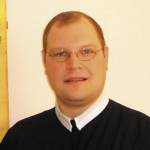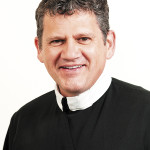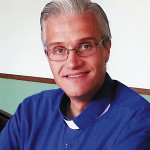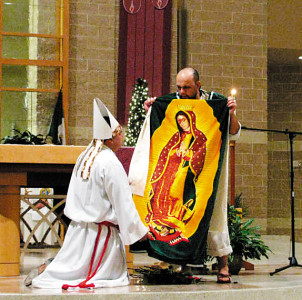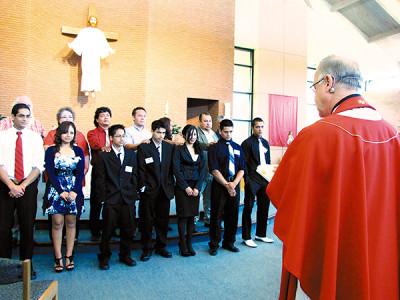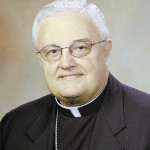
Latino
JACKSON – This June the Diocese of Jackson will honor four priests and a bishop emeritus who are celebrating significant anniversaries of ordination. Together they represent 235 years of service to the church. Each will mark these years with a Mass of Thanksgiving and reception open to the faithful.
Bishop Emeritus Joseph Latino will celebrate a delayed 50th anniversary Mass on Friday, June 6, at 6 p.m. in the Cathedral of Saint Peter the Apostle. Bishop Latino marked 50 years in May 2013, but was unable to have a public celebration due to his hospitalization on Good Friday and subsequent recovery process which continued for the remainder of 2013.
Ordained in St. Louis Cathedral in New Orleans on May 25, 1963, Bishop Latino served in parishes in Houma and New Orleans before being named the 10th bishop of Jackson by St. John Paul II on Jan. 3, 2003. He was ordained a bishop in St. Peter Cathedral two months later on March 7.
Bishop Latino is featured in the late Archbishop Philip Hannan’s book “The Archbishop Wore Combat Boots” for his time serving in the Desire Project in New Orleans during the Civil Rights’ movement. He spent the majority of his priesthood in Cajun country at St. Francis de Sales Cathedral in Houma, where he served as cathedral rector and vicar general for the Diocese of Houma-Thibodaux.
His time as bishop saw major growth in ministry to immigrants from Latin America, the establishment of the Bishop Chanche Medal – a diocesan award for laity, the implementation of the new translation of the Mass, deanery and regional confirmation celebrations, and an increase in seminarians – both home grown and from other countries. Bishop Latino retired as Ordinary on Dec. 12, 2013, when Bishop Joseph Kopacz was appointed as Bishop of Jackson. He served as administrator of the diocese until Bishop Kopacz’s ordination on Feb. 6, 2014.
All are invited to the Friday night liturgy on June 6. A reception will follow in the Cathedral Center.
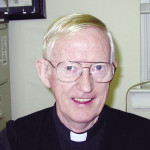
Flannery
On Tuesday, June 3, at 6:30 p.m., Msgr. Michael Flannery, pastor of St. Francis Parish in Madison, will celebrate a Mass of Thanksgiving at St. Francis to mark 50 years or ordination. A native of Limerick, Ireland, Msgr. Flannery was ordained on June 14, 1964, in the Cathedral of the Assumption in Thurles, Ireland, after finishing his studies at St. Patrick College in Thurles.
In addition to Madison, Msgr. Flannery’s life of service to the church includes parish ministry in Jackson, Pascagoula, Cleveland, Rosedale and the mission in Saltillo, Mexico.
In 1984 he received a degree in Canon Law from St. Paul University in Ottawa, Canada. He was appointed diocesan Judicial Vicar in 1986 and then Vicar General of the diocese in 1994, by then Bishop William Houck. He continued to serve as Vicar General until January 2005, when he was then appointed pastor of St. Francis.
Msgr. Flannery has served in many other diocesan capacities including chaplain to the Carmelites, chancellor, moderator of the curia, and member of the priests’ council. He is currently a member of the college of consultors. Pope John Paul II named him an honorary prelate or monsignor in 2002. In 2008, Pope Benedict XVI added to that honor by giving him the rank of Apostolic Protonotary.
Greenville St. Joseph Parish will host a 60th anniversary celebration for Father Frank Corcoran, on Monday, June 9, at 5:30 p.m. Father Corcoran resides at the parish and though he retired in 2001, remains very active in ministry.
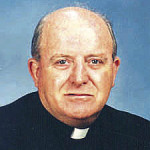
Corcoran
Born in Nenagh in County Tipperary, Ireland he was ordained to the priesthood on June 6, 1954, in the Cathedral of the Assumption in Carlow, Ireland, having completed his seminary studies at St. Patrick College in Carlow. His priestly ministry in the diocese includes assignments in Jackson, Vicksburg, Meridian, Greenville, Crystal Springs and Hazelhurst. While in Vicksburg he was chaplain to Mercy Hospital.
On the diocesan level, Father Corcoran served as director of the Confraternity of Christian Doctrine (CCD), confessor to the Carmelites and as Irish vocations director. Other offices in which he ministered were as dean, priests’ council member and consultor. Father Corcoran continues to live out his priestly commitment by visiting the sick and celebrating Mass in St. Joseph Parish.
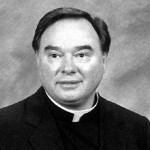
Dore
A reception will be held in the parish center immediately following the Mass.
Father Robert Dore, pastor of Annunciation Parish in Columbus, will celebrate his 25th anniversary of ordination with a Mass and reception on Tuesday, June 10, at 6:30 p.m. After completing his seminary studies at Mundelein in Chicago, Father Dore, who grew up in Natchez, was ordained on June 10, 1989, in St. Mary Basilica.
In addition to Columbus, he has served in Greenville, Vicksburg, Chatawa, Magnolia and West Point. Father Dore also has been dean of Deanery II and an auxiliary chaplain to the Air Force Base in Columbus.
Father Dore is currently guiding the restoration of the original Annunciation Church which is a historic building designed by Father Jean-Baptiste Mouton in the mid 19th century.
A native of County Limerick, Ireland, Father David O’Connor will celebrate a Mass of Thanksgiving on Wednesday, June 18, at 6 p.m. in St. Mary Basilica in Natchez. Father O’Connor presently serves as pastor of the basilica and Assumption Parish.
Upon completion of his studies at St. Patrick College in Thurles, Ireland, he was ordained to the priesthood on June 14, in the Cathedral of the Assumption in Thurles. Father O’Connor arrived in Meridian at St. Patrick Parish in 1964 for his first assignment as a young priest.
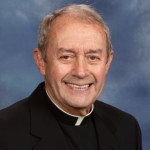
O’Connor
In addition to Natchez his 50 years of service have included parish ministry in Bay St. Louis, Oxford, Crystal Springs, Jackson and Greenwood. His diocesan ministries include: priests’ council president, chairman of the continuing formation committee, vicar forane, development director for St. Joseph School in Madison, defender of the bond and dean. Early on in his ministry he served as director of Irish vocations for the diocese. Father O’Connor holds a doctorate in ministry from Emory University in Atlanta.
A reception in the Family Life Center will follow the Mass.

